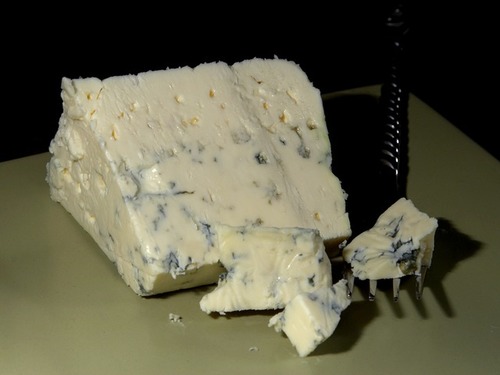Short answer
Blue cheese does have a few nutritional benefits, but it’s also heavy in fat and sodium. Moderation is important when consuming blue cheese.
Recommended Alternative
Long answer
All Cheeses, as you may know, are not created equally. Blue cheese, also known as Roquefort cheese, is characterized by its pungent smell and its edible blue mold. Heavily used in French diet, it’s often dubbed as the secret to why the French live longer on average than the rest of the world. Ultimately, blue cheese carries similar nutritional elements as other cheeses, with fat as the main factor to consider.
Fat
As you probably know by now, cheese is a by-product of milk, which is used as a primary food for nurturing/fattening babies, specifically young calves. Because of this, milk (and cheese) are mostly comprised of fat - saturated fats. It’s another reason extra cheese tickles your taste buds.
Our bodies need saturated fats so blue cheese in moderation can still align with a healthy, balanced diet. The only problem is defining moderation for some people. A serving of blue cheese contains about 8 grams of saturated fat, and based on a 2,000-calorie diet, this accounts for half of the amount of saturated fats needed. From this, we can conclude that a little bit goes a long way.
Sodium
Like other cheeses, blue cheese is rich in sodium to prevent it from rotting. According to Self.com, a seventeen-gram serving/cubic inch of blue cheese contains 237 milligrams of sodium, about 10% of our sodium needs (based on a 2,000 calorie diet). In conjunction with a diet filled with preservative-rich snacks and heavy seasonings, blue cheese can definitely pose a threat to overall blood pressure.
Protein and Calcium
On the other side, because cheese is a milk product, it is an efficient source of protein and the mineral calcium, which aids in bone growth and structure. The same one-inch cube contains about 4 grams of protein. However, compared to the amount of fat and sodium blue cheese contains, the protein advantage is rather discounted. For those in need of protein for health or bodyweight purposes, blue cheese is not recommended as a staple food in your diet.
So why do the French live longer?
According to Healthline, France is on the top-five list for lowest mortality rate by heart disease. Some say that blue cheese is the answer to the French’s longevity. The American Heart Association has concluded that although inflammation doesn’t cause cardiovascular disease, several patients dealing with the disease have shown signs of inflammation, and the blue mold in blue cheese has been found to have anti-inflammatory properties, according to Medical Hypothesis.
Blue cheese is pretty paradoxical. If you want to eat blue cheese, remember to eat it in moderation. Or you can test your luck and live like the French.
Possible short-term side effects
- promotes overeating
Possible long-term side effects
- weight gain
- high blood pressure/hypertension
Ingredients to be aware of
- saturated fat
- sodium

Benefits
- anti-inflammatory
- rich source of calcium and phosphorous (bone-building minerals)
- good vegetarian source of protein
Our Wellness Pick (what is this?)
Treeline Cashew Cheese
- Dairy-free alternative
- Vegan-friendly
- Plant-based ingredients
- Variety of flavors
- Convenient 10-pack
 Approved by
Approved by 















